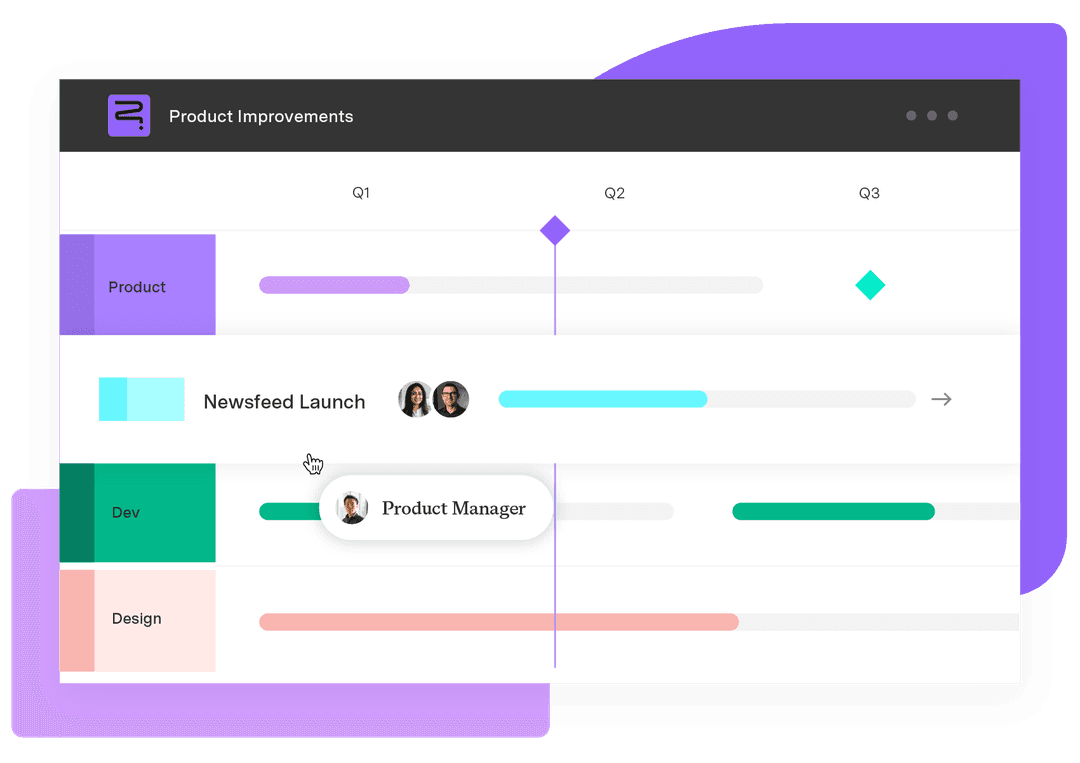The essential guide to marketing management
Tempo Team
You could spend years developing the next big problem-solving product, but it won’t succeed if nobody knows about it.
You need a way to inform the buying public about your products and services. From word-of-mouth to trending hashtags, proper marketing informs consumers of your offerings and builds brand recognition.
The key to organizing the steps, staff, and strategies you need is marketing management – a vital ingredient to soaring sales and a business that scales.
What’s marketing management?
Marketing management is the process of developing and implementing strategic programs, processes, and activities that promote a brand. It’s the umbrella under which all marketing practices fall.
Someone in the role of a marketing manager wears many hats, like:
Setting campaign goals and developing marketing strategies
Conducting market research
Delegating tasks
Identifying target audiences and buyer personas
Analyzing campaign metrics
Managing content on various platforms such as social media, traditional TV markets, and email
Many people use marketing and advertising interchangeably because they both raise product awareness. Marketing is the entire process of researching and conducting campaigns, whereas advertising is just the execution of promotions. The latter is just a piece of the puzzle.
Key elements of marketing management
Regardless of the type of marketing you’re working on, the process of managing it requires a few different elements. Here are the aspects of marketing you shouldn’t forget:
Marketing mix
The marketing mix is the 4 Ps of marketing: Product, price, place, and promotion. Every overarching strategy should consider these elements because they depend on each other to create great campaigns.
Marketing strategy
Your strategy defines the approaches you’ll use to engage with customers, like combining different channels and aiming for slow growth over time. A good marketing strategy allows for longevity and encompasses your plan, budget, and campaigns.
Marketing budget
Setting your marketing budget is one of the first steps you need to take because it defines the rest of your resource management decisions. You should know all of the costs involved in implementing your marketing team’s tasks, activities, and processes so you don’t go overboard.
Marketing plan
Create a detailed document that further outlines how you’ll execute the strategy (and how you’ll do so within budget). Include resources, deliverables, and a timeline.
Marketing campaign
This includes all of the activities and tactics you’ll implement to promote your product or service, along with how they relate to each other in terms of timeframe and resources. Some campaigns may include:
Digital marketing
Print ads
Social media marketing
Guerilla campaigns
Email marketing
Word of mouth
Types of marketing management
Whether you’re a marketing manager or someone interested in the process, you’ll encounter nine main types of activities under this umbrella:
Marketing strategy is your overall marketing and content plan for engaging with potential and existing customers.
Business development covers your strategic initiatives such as mergers and acquisitions and entering into new markets.
Brand management is the process of maintaining your brand value over time.
Product development is bringing new or improved products to market.
Global marketing is the method of international distribution.
Media relations covers media and social influencer engagement.
Customer marketing involves direct customer experience and satisfaction management strategies.
Marketing operations includes process, technology, and team management.
Sales covers lead generation and opportunity development strategies.
Marketing management’s main objectives
Depending on the company and the product, marketing management and leadership responsibilities will vary. But these are the main objectives that most teams strive to achieve:
1. Build a great team
Successful campaigns start with the people behind them. Enthusiasm, product knowledge, and creativity are all great attributes of a confident marketing team. You want everyone involved to have an ear to the ground to hear the pulse of the marketplace and produce unique, and informed, strategies.
2. Research the market
As a marketing manager, you need to understand how your product or service meets the wants and needs of your customer base – and you can’t do so without research.
Analyzing customer surveys, product reviews, and sales metrics (including peak sales periods) are all effective methods for determining satisfaction levels and learning where to improve your strategies. Consider using a project roadmap to track responses and organize new ideas.
3. Develop a strategy
Arguably the most important goal of business marketing management, your marketing plan needs to be clear and concise. It should encompass all the tasks and processes the team needs to raise customer awareness and increase sales, along with who will conduct them and when.
Here, the objective is to outline the customer journey through introduction to follow-up. Done successfully, your marketing strategy will resonate at every stage:
Awareness: A potential customer identifies a need or a want that your product or service may satisfy.
Consideration: They look at the specifications, availability (including shipping times), and pricing of your offering to see if it’s a viable purchase.
Decision: The customer compares your product with competitors and decides to go with you.
Conversion: They make a purchase or participate in the service you want them to.
Retention: They keep coming back for more.
4. Define and refine brand messaging
Effective messaging both tells consumers about your product and conveys your brand’s personality and attitude. To do this, your marketing team needs to create a clear mission statement, engaging identity, and presence that makes sense for your brand and audience.
When your brand messaging is on point, existing and potential customers will know who your product or service is for and what makes it unique. That way, they can connect with you.
5. Track metrics
You need to see how effective your marketing strategies are – where they’re working and where they need improvement. To do this, you’ll want to track metrics in various areas, such as:
Website traffic: This includes page views, conversion rates, and the time users spend on your site.
Social media platforms: Record and analyze engagement levels across all platforms to identify which perform best and why.
Email campaigns: Keep track of subscriber numbers and the conversion rates of people who visit your site via email.
SEO: Gauge your page and keyword rankings on search engines.
Advertising: Tracking metrics such as cost per lead and cost per click helps measure which digital ads perform the best.
6. Build a company image
Reasonable prices, quality products, and positive messaging are all part of attracting new customers, but they also retain the ones you already have. Use loyalty programs and subscriptions to engage your audience, and collect feedback as much as you can to learn what to do better.
7. Manage risk
Not only do you need a clear marketing plan and strategy to help reduce scope creep and waste, but you also need contingency plans for shortages and overages, product defects, or an influx of returns and refunds.
Choosing the best tool for marketing management
Marketing is more than building a brand identity. It’s a balancing act of different types of strategies that all come together for successful campaigns.
That’s why it’s vital for your marketing team to stay organized. You need to document every process, track progress, and communicate every step of the way.
Use Strategic Roadmaps and Jira Timesheet reporting to manage both your to-do list and your team. They’ll help you improve your strategic organization, prioritize your ideas, and keep you on top of all your marketing-related projects.












































